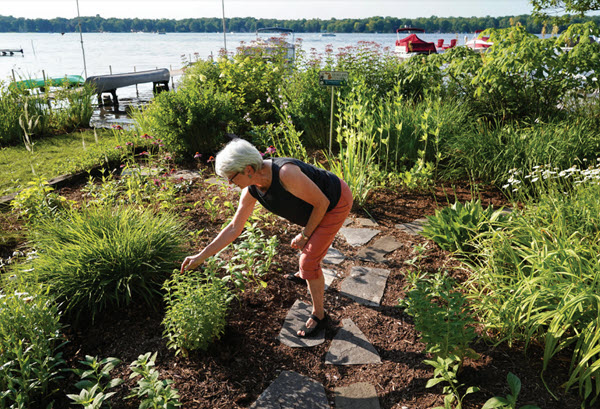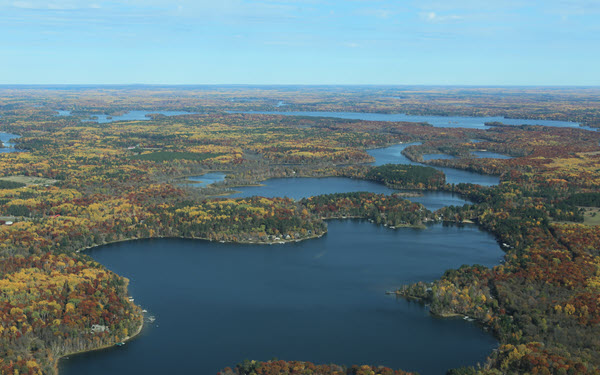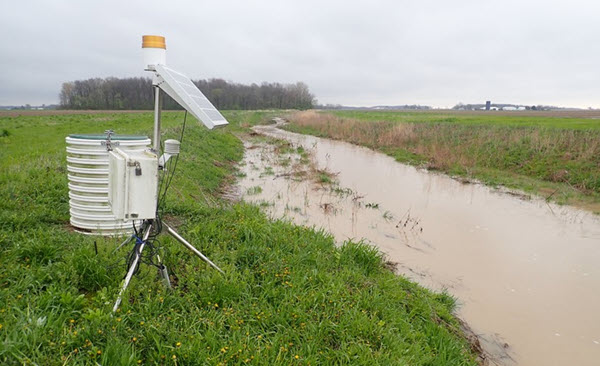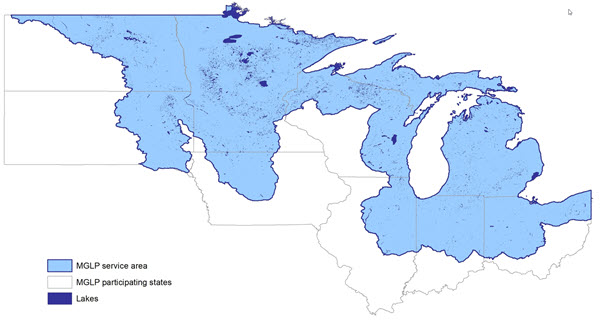The Midwest Glacial Lakes Partnership (MGLP) is awarding over $350,000 through its 2023 Lake Conservation Grant to five projects across the Upper Midwest. Together, these projects will benefit glacial lakes and their fish habitats, fish populations, and fisheries for years to come. Funds for the Lake Conservation Grant are provided by the US Fish and Wildlife Service and will be matched by nearly $400,000 in contributions from project partners, for a total conservation investment of over $750,000. The grant is operated annually by the MGLP as a fish habitat partnership under National Fish Habitat Partnership. The five funded projects are:
- Fostering Stewardship on Michigan’s Glacial Lakes – $68,910
- Linking Forests Water & Fisheries in the Midwest Glacial Lake Region: Building a Shared Conservation Funding Vision – $30,000
- Nutrient and sediment loadings in Clear Lake, Indiana: Water quality improvement and sustainable fish habitat – $59,450
- Phase 4: Data and Approaches to Support Conservation Efforts of the MGLP – $133,425
- MGLP Operations – $60,271
The MGLP’s request for the next round of Lake Conservation Grants is expected to be released in November. Those interested in future grant applications can find more information on the Lakes Conservation Grant page of the MGLP website and should sign up for this MGLP Newsletter to receive notifications if you are not already subscribed. Read more below about the projects that received funding this year.

Fostering Stewardship on Michigan’s Glacial Lakes
Huron River Watershed Council
The Huron River Watershed Council will promote shoreland protection by residents on six lakes in the Huron River watershed that support Cisco, Northern Pike, and other fish species sensitive to climate change and development (Bruin, South, Blind, Joslin, Bass, and Halfmoon). The Midwest Glacial Lakes Conservation Planner identified the mostly undeveloped shorelands and watersheds of these lakes as the critical areas to conserve and protect. This presents an opportunity to create awareness among lake property owners of the importance of natural shorelands in maintaining lake quality. The Huron River Watershed Council will engage with lake property owners to: (1) create a deep understanding of the connection between the land and lake quality; (2) teach how actions they take affect the lake; and (3) establish a stewardship ethic among residents. The Huron River Watershed Council will recruit volunteers to monitor lakes through Michigan’s Cooperative Lakes Monitoring Program. These lake ambassadors will help enroll at least 30 property owners into Michigan’s Shoreland Stewards Program and plant native terrestrial plants on 15 shorelines. At the end of the project, the Huron River Watershed Council will have developed a model program that other lake advocates can use throughout the Midwest Glacial Lakes area.

Linking Forests Water & Fisheries in the Midwest Glacial Lakes Region: Building a Shared Conservation Funding Vision
Minnesota Board of Water and Soil Resources
Private lands play a critical role in protecting the health of the 80,000+ lakes in the Midwest Glacial Lakes Partnership which are a unique, world class resource and fishery. Private forestlands have the greatest risk of conversion to other land uses, conversions which often increase stormwater runoff, reduce groundwater recharge, and degrade water quality. Dramatically increasing lake conservation work will require an integrated methodology that knits programs and services for the protection of private forestlands on a watershed basis along with greater funding. Therefore, it is essential for states in the MGLP to develop a shared vision to secure the available federal and foundation funding necessary to implement conservation on landscape scales. This project will convene a Forest Protection and Conservation Workshop to present the scientific foundations for linking water quality in lakes to forested watersheds and demonstrate watershed prioritization tools. A second workshop will engage state agency leaders to develop “A Conservation Funding Vision for the Midwest Glacial Lakes Region” document. This document will provide states in the MGLP a clear vision and context to guide the strategic development of policy and legislative initiatives to secure federal and other funding opportunities to protect forested watersheds and their glacial lakes.

Nutrient and sediment loadings in Clear Lake, Indiana: Water quality improvement and sustainable fish habitat
Clear Lake Township Land Conservancy
A major challenge for Clear Lake, and many glacial lakes in northern Indiana, is to accurately quantify and understand temporal patterns relative to lake external and internal nutrient and sediment loadings. This data is essential to improve or maintain trophic status of the lake and fish habitat. Partnering with Ecosystems Connections Institute, we will install a full water quality gage station at two major lake inflows and one partial gage station at the lake outflow. This study will provide data to quantify loadings and the necessary load reductions to improve water quality in Clear Lake, protect fish habitat, and quantify cold-water habitat compared to a reference lake (Lake Gage). Data will be threaded into a forward-thinking education/outreach program to build a cultural conservation bridge across human endeavors that will create lasting conservation partnerships for Clear Lake watershed restoration and protection.

Phase 4: Data and Approaches to Support Conservation Efforts of the MGLP
Michigan State University
The Midwest Glacial Lakes Partnership works to protect, rehabilitate, and enhance sustainable fish habitats in glacial lakes of the Midwest for the use and enjoyment of current and future generations. Partnership staffing is limited to a part-time coordinator, but otherwise is dependent upon grants and voluntary participation to accomplish partnership goals. In order to implement the fish habitat assessment and conservation goals of the partnership, the partnership needs to address basic database management needs. Specifically, the partnership will continue populate a database of fish habitat and fish population survey data across all states in the partnership as part of an ongoing effort to build capacity for the partnership’s conservation planning and outreach efforts. This database is essential to the partnership’s mission and provides key information to assess fish habitat threats and conditions, thereby improving efficiency and efficacy of projects funded by the partnership.
MGLP Operations
Michigan Department of Natural Resources
The funding that the MGLP allocates each year includes a portion set aside for operation of the partnership. In addition to 1:1 matching contributions from partner agencies, the MGLP uses these funds to coordinate the partnership’s efforts to assess the condition of and conserve fish habitats in inland glacial lakes. The coordinator oversees conservation grants, supports and participates in committees, coordinates partner contributions, manages the partnership’s finances, leads revisions to and implementation of the strategic plan, develops partnership identity and presence, provides technical analysis and guidance, represents the partnership at various meetings, and ensures communication with other fish habitat partnerships.
